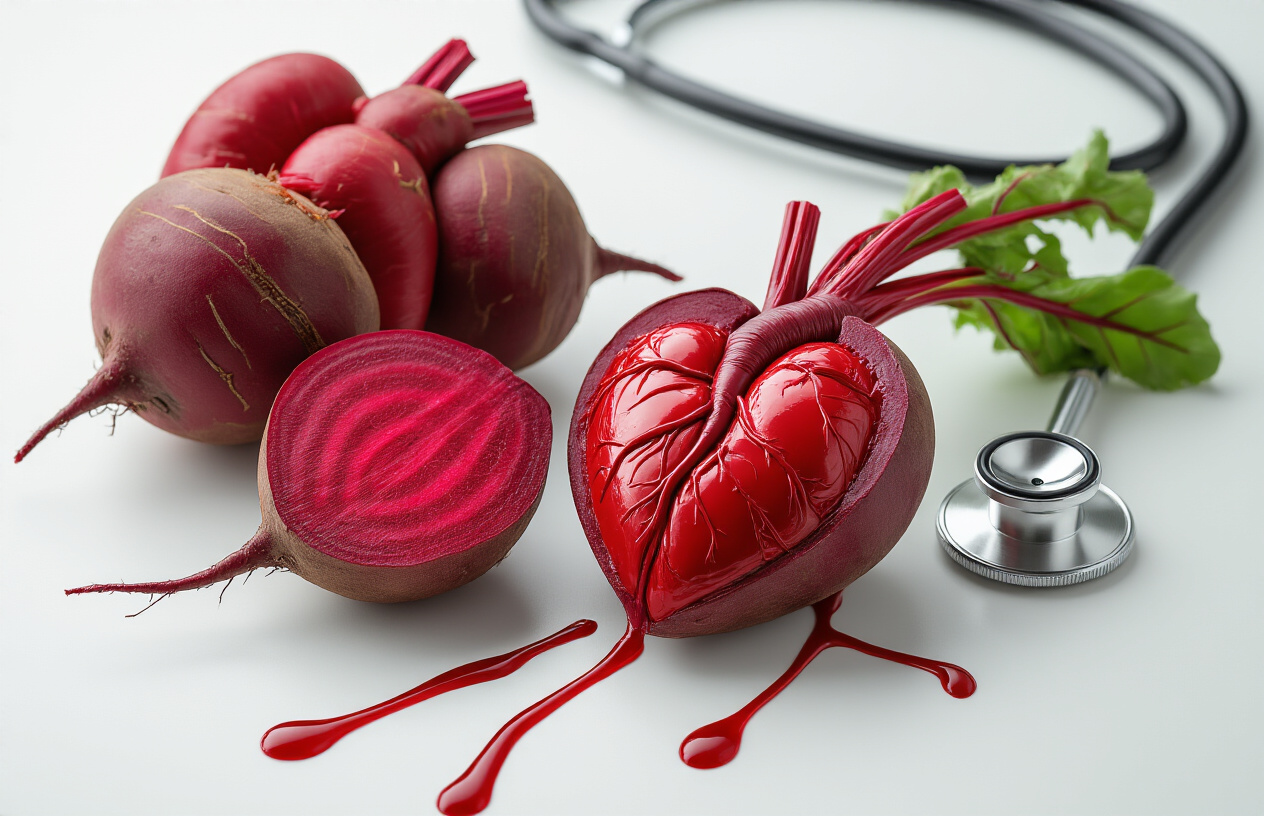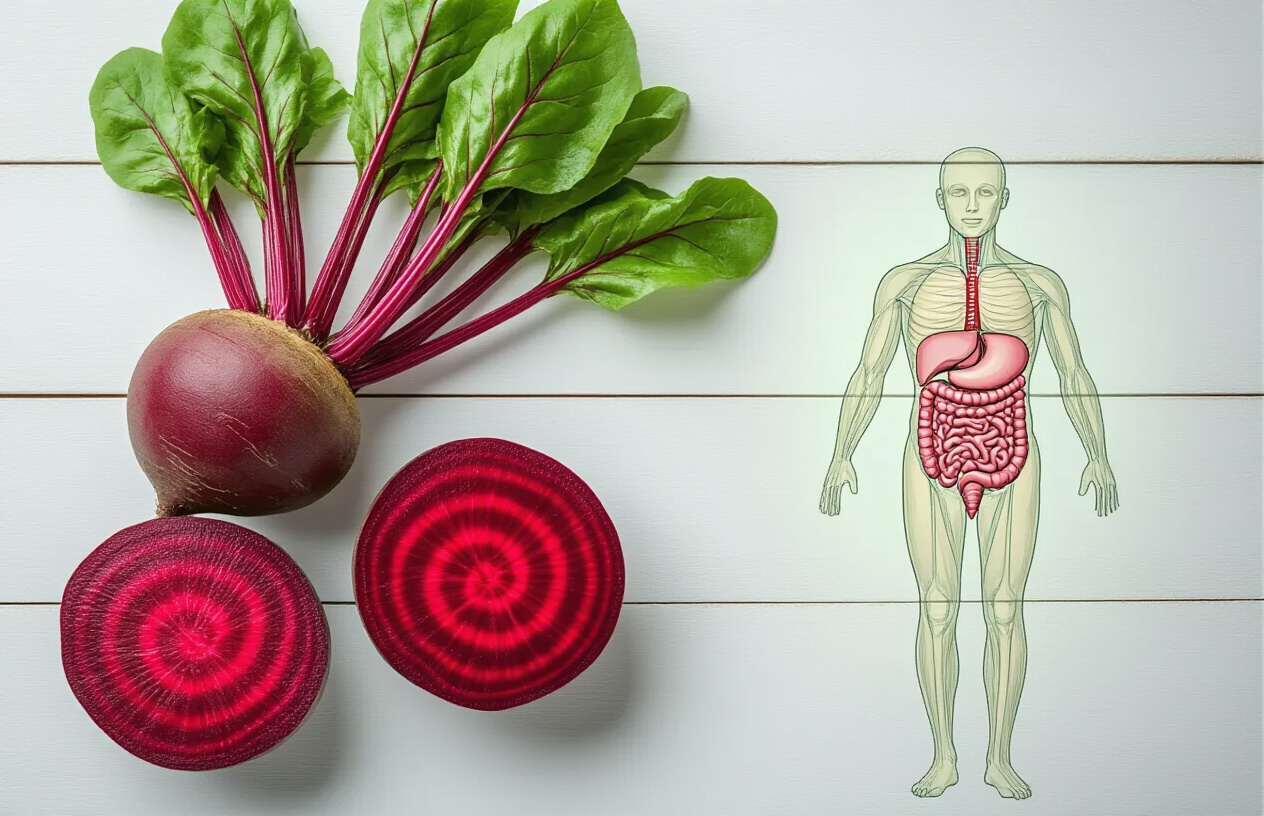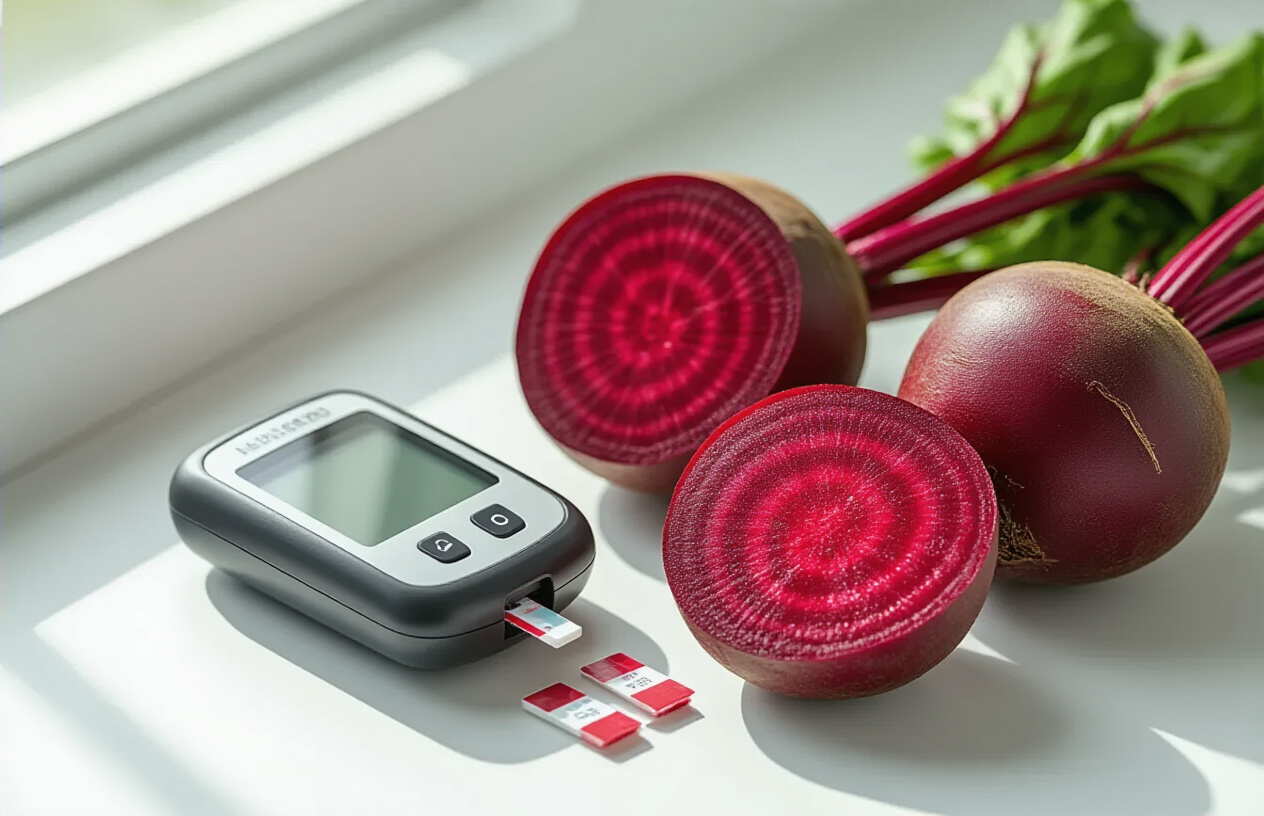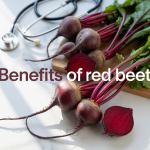Red beets pack a serious nutritional punch that can transform your health in surprising ways. This vibrant root vegetable offers benefits of red beet that extend far beyond its earthy flavor, making it perfect for fitness enthusiasts, health-conscious individuals, and anyone looking to boost their wellness naturally.
We’ll explore how red beets supercharge your cardiovascular system by improving blood flow and lowering blood pressure. You’ll also discover how these ruby gems enhance athletic performance through increased stamina and faster recovery. Finally, we’ll dive into their impressive anti-inflammatory and antioxidant properties that help your body fight off damage and stay strong.
Cardiovascular Health Benefits

Lower Blood Pressure Through Nitrates
Red beets pack a powerful punch when it comes to lowering blood pressure, and the secret lies in their high nitrate content. When you eat beets, your body converts these natural nitrates into nitric oxide, a molecule that acts like a key unlocking smoother blood flow. This process causes your blood vessels to relax and widen, creating more room for blood to flow freely without putting extra pressure on your arterial walls.
Studies show that drinking beet juice can reduce systolic blood pressure by up to 10 mmHg within hours of consumption. What makes this even more impressive is that the effect can last for several hours, giving your cardiovascular system sustained relief. Regular beet consumption has shown similar long-term benefits, making it a natural approach to managing hypertension alongside other healthy lifestyle choices.
Improved Blood Circulation
The nitric oxide boost from beets doesn’t just lower blood pressure – it dramatically improves circulation throughout your entire body. Better circulation means oxygen and nutrients reach your tissues more efficiently, while waste products get cleared away faster. You might notice improved energy levels, better skin color, and even warmer hands and feet as your circulation improves.
Athletes have caught onto this benefit, using beet juice as a natural way to enhance blood flow to working muscles. The improved circulation also benefits your brain, potentially sharpening mental clarity and focus. Even people with circulation issues related to diabetes or peripheral artery disease may find relief through regular beet consumption.
Reduced Risk of Heart Disease
The cardiovascular benefits of beets extend far beyond immediate blood pressure reduction. The combination of nitrates, fiber, folate, and betalains creates a protective shield for your heart. Regular beet consumption helps prevent the buildup of harmful cholesterol in your arteries, reducing the formation of dangerous plaques that can lead to heart attacks or strokes.
The antioxidants in beets also combat inflammation throughout your cardiovascular system. Chronic inflammation plays a major role in heart disease development, so getting these protective compounds regularly can be a game-changer for long-term heart health. The potassium in beets supports healthy heart rhythm, while the fiber helps maintain healthy cholesterol levels.
Enhanced Arterial Function
Your arteries need to be flexible and responsive to handle the constant changes in blood flow demands throughout your day. Beets help maintain this arterial flexibility, technically called endothelial function. The endothelium is the thin layer lining your blood vessels, and when it’s healthy, your arteries can expand and contract smoothly as needed.
Poor endothelial function is often one of the first signs of cardiovascular trouble, appearing years before symptoms develop. By supporting healthy endothelial function, beets help keep your arteries young and responsive. This enhanced arterial function also means better adaptation to exercise and stress, allowing your cardiovascular system to handle challenges more effectively while recovering faster afterward.
Athletic Performance Enhancement

Increased Exercise Endurance
Red beets pack a powerful punch when it comes to boosting your stamina during workouts. The secret lies in their high nitrate content, which your body converts into nitric oxide. This compound works like a natural performance enhancer, helping your blood vessels relax and widen, which means better blood flow to your muscles.
When you drink beet juice or eat beetroot before exercising, you’re essentially giving your cardiovascular system a tune-up. Studies show that athletes who consume beet juice can exercise longer before feeling fatigued. The nitrates help reduce the oxygen cost of physical activity, meaning your body doesn’t have to work as hard to maintain the same level of performance.
The timing matters too. Peak nitrate levels in your blood occur about 2-3 hours after consumption, so plan your beet intake accordingly. Many endurance athletes swear by beetroot shots taken a few hours before competition or intense training sessions.
Improved Oxygen Efficiency
Your muscles are constantly hungry for oxygen during exercise, and red beets help satisfy that appetite more efficiently. The nitric oxide produced from beetroot nitrates enhances mitochondrial function – these are the powerhouses of your cells that convert oxygen into usable energy.
This improved oxygen utilization means your muscles can generate more energy from the same amount of oxygen. Think of it like upgrading your car’s engine to get better gas mileage. Your body becomes more efficient at using the oxygen you breathe in, which translates to better performance and less fatigue.
Research has shown that beetroot supplementation can reduce oxygen consumption during submaximal exercise by up to 19%. This efficiency boost is particularly noticeable during high-intensity activities where oxygen demand is greatest. Cyclists, runners, and swimmers often report feeling less winded during training after incorporating beets into their nutrition routine.
Faster Muscle Recovery
Post-workout recovery is where red beets really shine as a natural recovery aid. The anti-inflammatory compounds in beetroot, particularly betalains, help reduce muscle soreness and speed up the healing process after intense exercise.
These compounds work by neutralizing free radicals and reducing inflammation markers in your blood. When your muscles experience less inflammatory stress, they can repair and rebuild faster. This means you can get back to training sooner and with less discomfort.
The improved blood flow from nitric oxide also plays a crucial role in recovery. Better circulation means more nutrients and oxygen reach your recovering muscles, while waste products like lactic acid get cleared out more efficiently. Many athletes notice reduced muscle stiffness and soreness when they include beet juice in their post-workout nutrition plan.
Digestive System Support

High Fiber Content for Gut Health
Red beets pack an impressive amount of dietary fiber, containing approximately 3.8 grams per cup of raw beetroot. This fiber comes in two forms: soluble and insoluble, both playing crucial roles in maintaining a healthy digestive system. The soluble fiber forms a gel-like substance in your stomach, helping to slow digestion and keep you feeling full longer. Meanwhile, the insoluble fiber adds bulk to your stool and helps food move more efficiently through your digestive tract.
The fiber in red beets acts as a prebiotic, feeding the beneficial bacteria in your gut microbiome. These good bacteria, including Lactobacillus and Bifidobacterium, thrive on the fiber content and produce short-chain fatty acids as byproducts. These fatty acids help reduce inflammation in the gut lining and create an environment where harmful bacteria struggle to survive. A balanced gut microbiome supports immune function, mood regulation, and overall digestive wellness.
Improved Bowel Movement Regularity
Regular consumption of red beets can significantly improve bowel movement frequency and consistency. The combination of fiber and natural sugars in beets helps stimulate peristalsis – the wave-like muscle contractions that move food through your intestines. This natural stimulation prevents constipation and promotes regular elimination patterns.
Beets also contain betalains, powerful compounds that give beets their deep red color. These betalains support the health of intestinal walls and help maintain the smooth muscle function necessary for proper digestion. Many people notice improvements in their bathroom habits within just a few days of adding beets to their regular diet.
The natural water content in beets, combined with their fiber, creates the ideal conditions for soft, well-formed stools. This prevents the strain and discomfort associated with hard, dry bowel movements while supporting the natural rhythm your body needs for optimal digestive health.
Enhanced Nutrient Absorption
Red beets contain compounds that actively support your body’s ability to absorb and utilize nutrients from food. The betalains in beets help protect the delicate lining of your small intestine, where most nutrient absorption takes place. A healthy intestinal lining means your body can more effectively extract vitamins, minerals, and other essential nutrients from everything you eat.
Beets also support the production of digestive enzymes and stomach acid, both critical for breaking down food into absorbable components. The folate content in beets plays a role in DNA synthesis and cell division, supporting the rapid turnover of intestinal cells that keeps your digestive lining healthy and functional.
The nitrates in beets improve blood flow throughout your digestive system, ensuring that nutrients absorbed in your intestines can quickly reach other parts of your body where they’re needed. This improved circulation also supports the delivery of oxygen and nutrients to digestive organs, helping them function at their best and process food more efficiently.
Blood Sugar Management

Natural Blood Glucose Regulation
Red beets pack a powerful punch when it comes to keeping your blood sugar levels in check. The secret lies in their unique combination of natural compounds, particularly betalains and dietary fiber. These crimson root vegetables contain natural sugars that are released slowly into your bloodstream, preventing those dreaded spikes that can wreak havoc on your energy levels.
The fiber content in beets acts like a natural speed bump for sugar absorption. When you eat beets, the fiber forms a gel-like substance in your digestive tract that slows down how quickly glucose enters your blood. This means your pancreas doesn’t have to work overtime pumping out insulin to handle a sudden sugar rush.
Betalains, those compounds that give beets their vibrant red color, also play a crucial role in glucose metabolism. Research shows these antioxidants help your cells respond better to insulin signals, making the whole blood sugar regulation process more efficient.
Improved Insulin Sensitivity
Your cells become better listeners when beets are part of your regular diet. Insulin sensitivity refers to how well your cells respond when insulin knocks on their door with glucose in hand. Poor insulin sensitivity means your cells ignore these signals, leaving sugar floating around in your bloodstream where it doesn’t belong.
Beets contain nitrates that convert to nitric oxide in your body. This compound helps improve blood flow and cellular function, making your muscle and fat cells more receptive to insulin’s message. When your cells are more sensitive to insulin, less of this hormone is needed to clear glucose from your blood.
The magnesium content in beets also supports insulin function. This mineral acts like a key that helps unlock cellular doors for glucose entry. Regular consumption of beets can help maintain healthy magnesium levels, supporting optimal insulin sensitivity over time.
Sustained Energy Release
Unlike processed foods that send your energy levels on a roller coaster ride, beets provide steady, reliable fuel for your body. The natural sugars in beets come packaged with fiber, which acts like a time-release mechanism for energy delivery.
This combination means you get sustained energy without the crash that follows sugary snacks or drinks. Your blood sugar rises gently and stays stable for longer periods, giving you consistent energy levels throughout the day. Athletes have long recognized this benefit, using beet juice as a natural energy source that doesn’t cause dramatic blood sugar swings.
The complex carbohydrates in beets also contribute to this steady energy release. Your body breaks these down gradually, providing a continuous supply of glucose to fuel your brain and muscles without overwhelming your blood sugar control systems.
Reduced Sugar Cravings
When your blood sugar levels are stable, those intense sugar cravings become much less frequent and powerful. Beets help break the cycle of blood sugar spikes and crashes that trigger cravings for sweet foods.
The natural sweetness in beets can help satisfy your taste buds while providing beneficial nutrients instead of empty calories. This can be particularly helpful when you’re trying to reduce your intake of processed sugars and artificial sweeteners.
The fiber in beets also helps you feel full and satisfied after eating, reducing the likelihood that you’ll reach for sugary snacks between meals. This satiety effect works hand-in-hand with stable blood sugar levels to keep cravings at bay and support healthy eating patterns throughout the day.
Brain Function and Cognitive Health
Enhanced Mental Clarity
Red beets pack a powerful punch for your brain thanks to their high nitrate content. When you eat beets, your body converts these nitrates into nitric oxide, which opens up blood vessels and increases blood flow throughout your body – including your brain. This improved circulation delivers more oxygen and nutrients to brain cells, creating the perfect environment for sharper thinking and mental clarity.
The betalains in beets also play a crucial role in protecting brain tissue from oxidative stress. These vibrant red pigments act as natural antioxidants, neutralizing harmful free radicals that can cloud your thinking and make you feel mentally foggy. Regular beet consumption can help you feel more alert and mentally agile throughout the day.
Studies show that people who drink beet juice experience noticeable improvements in their ability to process information quickly and make decisions. The enhanced blood flow reaches areas of the brain responsible for executive function, helping you think more clearly under pressure and maintain mental sharpness even during demanding tasks.
Improved Memory Function
The nitrates in beets specifically benefit the hippocampus, your brain’s memory center. Increased blood flow to this region supports both short-term and long-term memory formation. Research demonstrates that older adults who consumed beetroot juice showed improved memory performance compared to those who didn’t.
Beets contain folate, a B-vitamin essential for proper brain development and function. Folate deficiency has been linked to memory problems and cognitive decline. By including beets in your diet, you’re providing your brain with this critical nutrient needed for memory consolidation and recall.
The choline found in beet greens also supports memory function by helping produce acetylcholine, a neurotransmitter crucial for memory and learning. Don’t toss those leafy tops – they’re brain food too!
Better Focus and Concentration
Beets can transform your ability to stay focused during mentally demanding activities. The improved cerebral blood flow doesn’t just enhance clarity – it specifically supports the prefrontal cortex, the brain region responsible for attention and concentration.
The natural sugars in beets provide steady glucose to fuel brain cells without causing the energy crashes associated with processed sugars. This stable energy supply helps maintain consistent focus levels throughout the day, preventing the mid-afternoon mental slumps that derail productivity.
Athletes who consume beet juice before training often report better mental focus during their workouts. This same principle applies to mental tasks – the enhanced oxygen delivery helps you maintain concentration for longer periods without mental fatigue setting in.
Detoxification and Liver Support
Natural Liver Cleansing Properties
Red beets contain powerful compounds called betalains, which give them their deep crimson color and act as natural detoxifiers for your liver. These pigments work like tiny cleanup crews, helping your liver process and eliminate waste more effectively. The betaine found in beets supports the liver’s methylation process, which is crucial for breaking down harmful substances and converting them into water-soluble compounds that your body can easily flush out.
Your liver works around the clock to filter toxins, and beets provide the nutritional support it needs to function optimally. The fiber in beets also plays a supporting role by binding to bile acids in your digestive tract, forcing your liver to use stored cholesterol to make new bile acids. This process helps reduce cholesterol levels while keeping your liver actively engaged in its cleansing duties.
Elimination of Harmful Toxins
Beets excel at helping your body eliminate environmental toxins, heavy metals, and metabolic waste products. The glutathione precursors in beets boost your body’s master antioxidant system, creating a more robust defense against cellular damage from toxins. This enhanced glutathione production helps neutralize free radicals and supports Phase II detoxification in the liver.
The natural nitrates in beets convert to nitric oxide, which improves blood flow throughout your detoxification organs. Better circulation means toxins move more efficiently from tissues to elimination pathways. Beets also contain pectin, a soluble fiber that binds to heavy metals like lead and mercury, helping escort them out of your system before they can accumulate in organs and tissues.
Improved Metabolic Function
Regular consumption of red beets can significantly enhance your metabolic efficiency. The nitrates in beets improve mitochondrial function, the powerhouses of your cells, leading to better energy production and waste removal at the cellular level. This boost in cellular metabolism means your body processes nutrients more effectively while generating fewer toxic byproducts.
Beets support healthy insulin sensitivity, which directly impacts how well your body metabolizes sugars and fats. When your metabolism runs smoothly, you’re less likely to accumulate metabolic waste that can burden your detoxification systems. The B-vitamins in beets, particularly folate, support numerous enzymatic reactions involved in metabolism and detoxification pathways.
Enhanced Kidney Health
Your kidneys and liver work as a team to filter waste from your blood, and beets support both organs beautifully. The potassium in beets helps regulate fluid balance and supports healthy kidney function by maintaining proper electrolyte levels. This mineral also helps counteract the effects of excess sodium, reducing the workload on your kidneys.
Beets contain compounds that may help prevent kidney stone formation by increasing urine volume and reducing the concentration of stone-forming minerals. The antioxidants in beets protect kidney tissues from oxidative stress, which can lead to chronic kidney problems over time. The improved blood flow from beet consumption also benefits kidney function by ensuring these vital organs receive adequate oxygen and nutrients to perform their filtering duties effectively.
Anti-Inflammatory and Antioxidant Properties
Reduced Chronic Inflammation
Red beets pack powerful anti-inflammatory compounds that work behind the scenes to calm your body’s internal fire. The deep crimson color comes from betalains, particularly betanin and vulgaxanthin, which are nature’s inflammation fighters. These compounds target inflammatory markers like C-reactive protein and tumor necrosis factor-alpha, helping to dial down the body’s overactive immune response.
When your body stays in a constant state of low-grade inflammation, it creates the perfect storm for chronic diseases. Red beets help break this cycle by blocking inflammatory pathways at the cellular level. Studies show that people who regularly consume beet juice experience measurably lower levels of inflammatory markers in their blood. The nitrates in beets also play a supporting role, converting to nitric oxide and helping blood vessels relax while reducing inflammatory stress on the cardiovascular system.
Regular beet consumption can help manage inflammatory conditions like arthritis, where joint pain and stiffness often improve with consistent intake. The anti-inflammatory benefits extend to muscle recovery after exercise, making beets a favorite among athletes looking to bounce back faster from intense training sessions.
Protection Against Free Radicals
Your body constantly battles free radicals – unstable molecules that damage cells and accelerate aging. Red beets serve as your personal army of antioxidants, neutralizing these harmful compounds before they can wreak havoc. The betalain pigments that give beets their vibrant color double as potent antioxidants, working alongside vitamin C and folate to create a comprehensive defense system.
Free radical damage accumulates over time, contributing to everything from wrinkles to serious diseases like cancer and heart disease. Beets contain multiple antioxidant families that work together synergistically. The phenolic compounds, flavonoids, and carotenoids each target different types of oxidative stress, creating layers of protection throughout your body.
| Antioxidant Type | Function | Benefit |
|---|---|---|
| Betalains | Neutralize reactive oxygen species | Cellular protection |
| Vitamin C | Water-soluble antioxidant | Immune support |
| Folate | DNA protection | Genetic stability |
| Phenolic compounds | Anti-radical activity | Overall antioxidant boost |
The antioxidant activity in beets remains stable even after cooking, making them a reliable source of protection regardless of how you prepare them. Raw beets provide the highest concentration, but roasted, pickled, or juiced beets still deliver significant antioxidant benefits.
Slowed Aging Process
Aging happens when cellular damage outpaces your body’s ability to repair itself. Red beets help tip the scales in your favor by providing the tools your cells need to maintain themselves and resist age-related decline. The combination of antioxidants and anti-inflammatory compounds creates an environment where healthy cellular function can thrive.
Telomeres, the protective caps on your chromosomes, naturally shorten with age. Some research suggests that the nutrients in beets may help slow this process, potentially extending cellular lifespan. The folate content supports DNA repair mechanisms, while the antioxidants prevent the kind of damage that accelerates cellular aging.
Your skin, brain, and cardiovascular system particularly benefit from beets’ anti-aging properties. The improved blood flow from nitrates delivers oxygen and nutrients more efficiently to all organs, while the antioxidants protect against the oxidative stress that leads to visible signs of aging. People who regularly consume antioxidant-rich foods like beets often report better energy levels, clearer skin, and improved mental clarity as they age.
The betalains in beets also support mitochondrial function – the powerhouses of your cells become more efficient at producing energy when protected from oxidative damage. This translates to better endurance, faster recovery, and maintained vitality as you age.
Red beets pack an impressive nutritional punch that touches nearly every aspect of your health. From supporting your heart and boosting athletic performance to helping manage blood sugar and keeping your brain sharp, these vibrant root vegetables offer benefits that extend far beyond their earthy flavor. The natural compounds in beets work to reduce inflammation, support liver detoxification, and promote healthy digestion – making them a true superfood worth adding to your regular routine.
Ready to experience these benefits yourself? Start small by adding fresh beet juice to your morning routine, tossing roasted beets into your salads, or blending them into smoothies. Your cardiovascular system, energy levels, and overall health will thank you for making this simple but powerful addition to your diet. The science is clear – beets deserve a spot on your plate.









